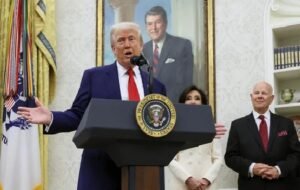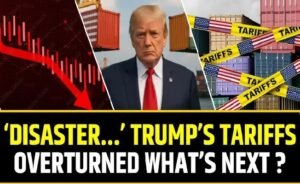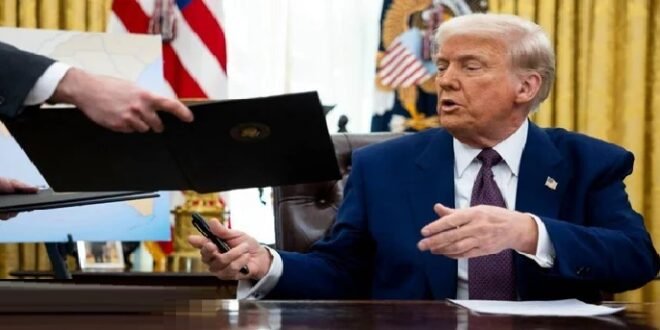02-09-2025
WASHINGTON: A federal appeals court has ruled that most of Donald Trump’s tariffs are an overreach of his use of emergency powers as president.
The so-called reciprocal tariffs, imposed on nearly every country the US trades with are being illegally imposed, the US Court of Appeals said on Friday.
 The decision upholds a ruling in May from the Court of International Trade, which also rejected Trump’s argument that his global tariffs were permitted under an emergency economic powers act.
The decision upholds a ruling in May from the Court of International Trade, which also rejected Trump’s argument that his global tariffs were permitted under an emergency economic powers act.
Many of the tariffs that would be affected by the ruling stem from an announcement in April of a flat 10% rate on imports from all countries, which Trump said would even out “unfair” trade relations with the US.
The court did not halt the tariffs but instead said they would remain in place until mid-October, setting up a further legal challenge in the US Supreme Court.
There are still a lot of unknowns but here’s what we understand so far about the ruling and what it could mean for the US president’s flagship policy.
What did the appeals court say?
In its 7-4 decision, the appellate court backed a lower court’s finding that Trump did not have the authority to impose global tariffs.
This was largely because of the law Trump used to justify the policies, the International Emergency Economic Powers Act (IEEPA), which the judges said did not grant “the power to impose tariffs, duties, or the like, or the power to tax”.
The US Court of Appeals rejected Trump’s argument that the tariffs were permitted under his emergency economic powers, calling the levies “invalid as contrary to law”.
Trump immediately criticized the judgement, taking to Truth Social in the hours after it landed to call the appeals court “highly partisan” and the ruling a “disaster” for the country.
 “If allowed to stand, this Decision would literally destroy the United States of America,” he wrote.
“If allowed to stand, this Decision would literally destroy the United States of America,” he wrote.
What is the IEEPA?
The decades-old act, which has repeatedly been deployed by Trump during both his terms in office, grants a US president significant authority to respond to a national emergency or a major threat from overseas.
The 1977 law states that a president can pull a number of economic levers “to deal with any unusual and extraordinary threat, which has its source in whole or substantial part outside the United States, to the national security, foreign policy or economy”.
It’s been used by both Presidents Barack Obama and Joe Biden, who invoked the act to impose sanctions on Russia after the illegal annexation of Crimea in 2014 and then again after the full-scale invasion of Ukraine eight years later but the appeals court stated in its decision that the emergency law “did not give the president wide-ranging authority to impose tariffs”.
The IEEPA “neither mentions tariffs (or any of its synonyms) nor has procedural safeguards that contain clear limits on the president’s power to impose tariffs”, they said.
Trump argued when he unveiled his global tariffs that a trade imbalance was harmful to US national security and was therefore a national emergency but the court ruled that imposing tariffs is not within the president’s mandate, and “the power of the purse (including the power to tax) belongs to Congress”.
Beyond being a significant setback to a centerpiece of Trump’s agenda, the federal appeals court ruling could have an immediate impact on the US economy, with knock-on effects felt in global markets. (Int’l Monitoring Desk)
 Pressmediaofindia
Pressmediaofindia




